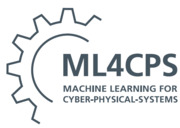 | ML4CPS 2025: Machine Learning 4 Cyber Physical Systems 2025 Fraunhofer Forum, Anna-Louisa-Karsch-Straße 2 Berlin, Germany, March 6-7, 2025 |
| Conference website | https://www.hsu-hh.de/imb/en/ml4cps |
| Submission link | https://easychair.org/conferences/?conf=ml4cps2025 |
| Abstract registration deadline | January 20, 2025 |
| Submission deadline | January 20, 2025 |
Cyber-physical systems possess the capability to adjust to evolving demands. When coupled with machine learning, various domains like predictive maintenance, self-optimization, and fault diagnosis spring to mind. An essential condition for for leveraging this potential is the accessibility of machine learning techniques to engineers.
The 8th Machine Learning 4 Cyber Physical Systems - ML4CPS - conference offers researchers and users from various fields an exchange platform. The conference will take place March 2025 6th till 7th at the Fraunhofer Forum in Berlin. Hosts are Fraunhofer IOSB, Helmut Schmidt University, Hamburg University of Technology and the Chair of Production Engineering of E-Mobility Components (PEM) of RWTH Aachen.
For more information please visit https://www.hsu-hh.de/imb/en/ml4cps
Submission Guidelines
Papers are chosen on a peer-review basis and accepted papers are published by the Helmut Schmidt University Press (openHSU) accompanied by a unique DOI number. Papers with commercial character will not be taken into consideration. The length of the papers should not exceed 10 pages:
Papers may cover, but are not limited to the following topics:
- Generative AI for CPS: Technologies like large language models possess the capability to facilitate human-machine interaction. This unlocks novel opportunities for intelligent automation and the increase of the overall performance and functionality of cyber-physical systems.
- Automated Modelling: Developing and using models to learn behaviors and structures of cyber-physical systems. This includes intelligent methods to integrate prior and domain-knowledge as well as engineering approaches.
- Industrial AI: Integrating AI into manufacturing processes can help to optimize them and enhance operational efficiency. Integrating AI into legacy systems and existing infrastructure is still a major challenge.
- Edge AI: This involves running AI algorithms directly on local devices, which enables real-time data processing. Main challenges are energy efficiency and limited computational resources.
- Self-supervised learning: Minimizing the reliance on large, labeled datasets for machine learning is a key focus when examining production data. Techniques that allow models to learn from unlabeled data are essential.
Committees
General Chairs
- Jürgen Beyerer, Fraunhofer IOSB
- Oliver Niggemann, HSU
- Achim Kampker, RWTH Aachen
- Görschwin Fey, TUHH
Organising Commitee
- Christian Kühnert, Fraunhofer IOSB
- Alexander Diedrich, HSU
- Rui Yan Li, RWTH Aachen
- Philip Johann Overlöper, HSU
Program Committee
- Volker Lohweg, OWL University of Applied Sciences and Arts
- Alexander Fay, Helmut-Schmidt-University Hamburg
- Ingo Pill, Silicon Austria Labs
- Alexander Maier, University of Applied Sciences Bielefeld
- Kaja Balzereit, University of Applied Sciences Bielefeld
- Patrick Rodler, Alpen-Adria-University Klagenfurt
- Silke Merkelbach, Fraunhofer IEM
- Marcel Drescher, RWTH Aachen
- Idel Montalvo, IngeniousWare GmbH
Venue
Fraunhofer Forum Berlin
Anna-Louisa-Karsch-Straße 2, 10178 Berlin
Contact
All questions about submissions should be emailed to ml4cps_orga@hsu-hh.de
